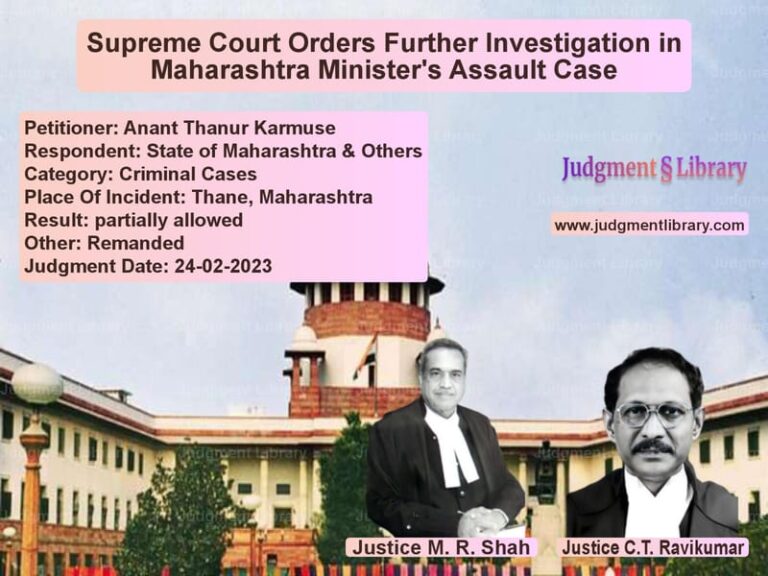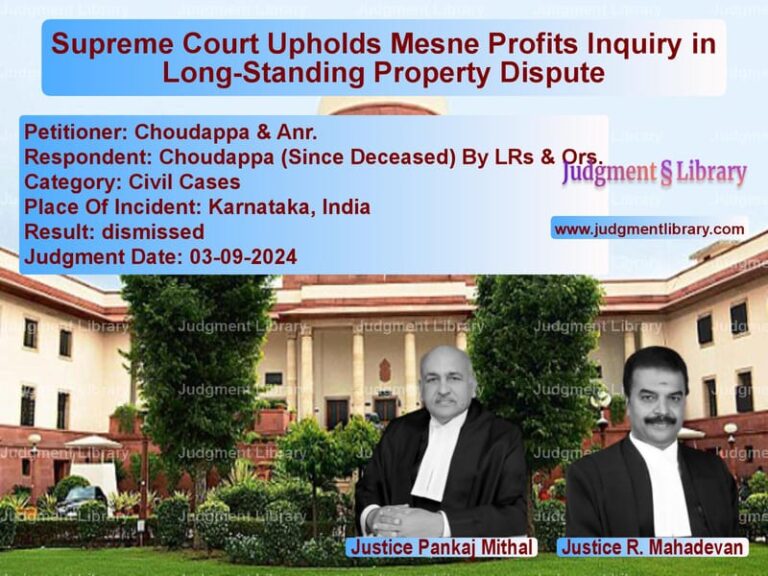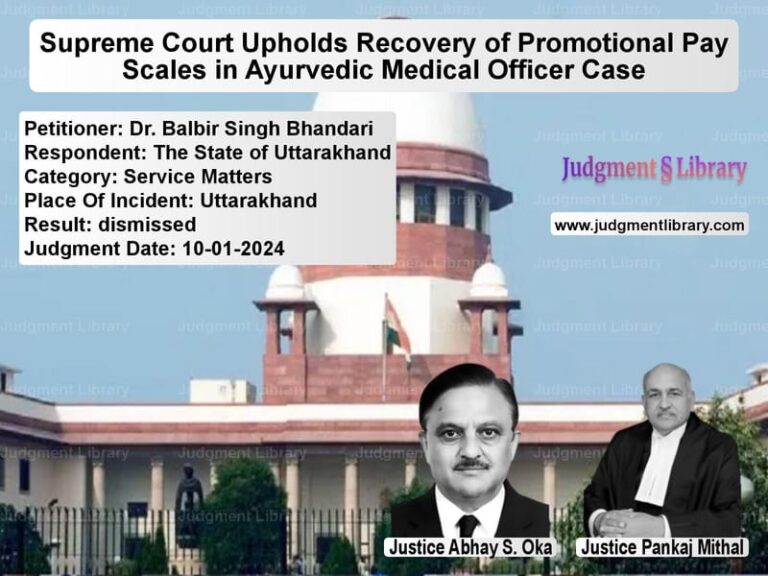Supreme Court Rejects Plea Against Election Petition in Kerala Assembly Poll Case
The case of Abdulrasakh vs. K.P. Mohammed & Others is a significant ruling concerning election disputes under the Representation of the People Act, 1951. The Supreme Court upheld the Kerala High Court’s decision to allow an election petition challenging the victory of the appellant, Abdulrasakh, from the Koduvally Assembly Constituency in the 2016 Kerala Legislative Assembly elections.
The Court ruled that the election petition was maintainable and rejected the appellant’s plea for summary dismissal, stating that technical objections regarding defects in the petition could be corrected and were not grounds for outright dismissal.
Background of the Case
The appellant, Abdulrasakh, contested as an independent candidate in the Koduvally Assembly Constituency elections held on May 16, 2016. He won the election and was declared the returned candidate on May 19, 2016.
Two voters, K.P. Mohammed and another, filed an election petition challenging his victory, alleging corrupt practices under Section 123(4) of the Representation of the People Act, 1951. The petition claimed that the appellant had made false statements about another candidate, knowing them to be false, thereby prejudicing the election outcome.
Key Issues Raised in the Election Petition
- The election petition alleged that the appellant engaged in corrupt practices by making false allegations against a rival candidate.
- The petition was initially filed on July 1, 2016, but had certain defects and was re-presented on July 11, 2016, after corrections.
- The appellant contended that the petition was time-barred as the 45-day limitation period ended on July 3, 2016, and the re-presentation of the petition was beyond this period.
Appellant’s Arguments (Abdulrasakh)
The appellant sought summary dismissal of the election petition, arguing:
- The petition was time-barred, as it was not filed within the mandatory 45-day period.
- The Registry had no power to return the election petition for correction of defects, and the High Court should have dismissed it outright.
- Even after re-presentation, the petition contained defects and should not have been entertained.
- The petitioners failed to comply with Sections 81 and 83 of the Representation of the People Act, making the petition invalid.
Respondents’ Arguments (Election Petitioners)
The respondents countered:
- The petition was originally filed within the limitation period, and minor defects did not render it invalid.
- The Registry’s decision to return the petition for correction was procedural and did not affect its validity.
- The High Court had discretion to allow the curing of defects, as they were not substantial in nature.
- The petition raised serious allegations of corrupt practices, warranting a full trial.
Supreme Court’s Observations
The Supreme Court dismissed the appellant’s objections, holding that:
“There is no legal bar to correcting minor defects in an election petition after its initial filing. The High Court rightly allowed the petitioners to cure the defects before issuing notice.”
The Court further emphasized:
“Section 86(1) of the Representation of the People Act mandates dismissal only if the petition fails to comply with Sections 81, 82, or 117. The appellant has failed to show that any such violations occurred.”
Key Findings of the Supreme Court
- The election petition was filed within the limitation period, and procedural corrections did not invalidate it.
- The Registry had the authority to return the petition for curing defects, and this was a common practice.
- The defects pointed out were minor and did not impact the maintainability of the petition.
- The allegations in the petition warranted a trial and could not be dismissed summarily.
Final Judgment
The Supreme Court ruled:
- The appeal by the elected candidate was dismissed.
- The election petition was allowed to proceed for trial in the Kerala High Court.
- The High Court was directed to expedite the trial, ensuring a fair hearing for both parties.
Key Takeaways from the Judgment
- Technical Defects Do Not Invalidate an Election Petition: Minor errors in an election petition can be corrected, and such corrections do not render the petition void.
- Fair Trial Over Technicalities: Courts prioritize substantive justice over procedural technicalities in election disputes.
- Importance of Election Laws: The ruling reinforces the principle that allegations of corrupt practices must be investigated thoroughly.
- Role of High Courts in Election Disputes: High Courts have discretion in allowing corrections and deciding election petitions based on merit.
Conclusion
This ruling ensures that election petitions raising serious allegations are not dismissed on mere technicalities. By upholding the High Court’s decision, the Supreme Court reaffirmed its commitment to preserving the integrity of the electoral process.
Petitioner Name: AbdulrasakhRespondent Name: K.P. Mohammed & OthersJudgment By: Justice Sanjay Kishan KaulPlace Of Incident: Kerala, IndiaJudgment Date: 08-03-2018
Don’t miss out on the full details! Download the complete judgment in PDF format below and gain valuable insights instantly!
Download Judgment: Abdulrasakh vs K.P. Mohammed & Othe Supreme Court of India Judgment Dated 08-03-2018.pdf
Direct Downlaod Judgment: Direct downlaod this Judgment
See all petitions in Public Interest Litigation
See all petitions in Fundamental Rights
See all petitions in Constitution Interpretation
See all petitions in Judgment by Sanjay Kishan Kaul
See all petitions in dismissed
See all petitions in supreme court of India judgments March 2018
See all petitions in 2018 judgments
See all posts in Election and Political Cases Category
See all allowed petitions in Election and Political Cases Category
See all Dismissed petitions in Election and Political Cases Category
See all partially allowed petitions in Election and Political Cases Category







